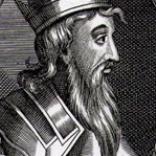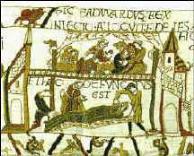See also
- Edward KING OF THE ENGLISH's parents: Athelred II The Unready KING OF THE ENGLISH (978-1016) and Emma de Normandie (986-1052)
- Edward KING OF THE ENGLISH's siblings: Alfred ( -1036) and Godgifu ( - )
Edward KING OF THE ENGLISH ( -1066)
1. Edward the Confessor KING OF THE ENGLISH (also known as St.Edward the Confessor KING OF THE ENGLSIH), son of Athelred II The Unready KING OF THE ENGLISH (978-1016) and Emma de Normandie (986-1052), died in 1066.
reigned 1042-1066.
Edward the Confessor, the son of Ethelred the Redeless and Emma of Normandy was born at Islip in 1004. He was of medium height and was said by some chroniclers to be an albino. Edward had accompanied his father into exile in Normandy in 1016. Brought up in Normandy from the age of twelve, he had acquired the tastes and outlook of a Norman and was extremely fond of his Norman relations including his cousin William, the future Conqueror. He appointed a Norman, Robert of Jumieges as Archbishop of Canterbury, an action which was much resented by the Saxon people.
He married Edith, the daughter of Earl Godwine, whom he found all-powerful on his accession to the throne. He was said to have secretly detested Godwine for his part in the murder of his brother Alfred. The new King was extremely pious and devout and had longings for a monastic life.
Edward's sister, Goda, was the wife of a powerful Norman nobleman, Eustace, Count of Boulogne, who visited his brother-in-law in England. While passing through Dover, Eustace and his retainers greatly offended the citizens of the town by taking free lodgings. A scuffle developed, and an Englishman wounded, who acting in self-defence, slew one of the Normans. His house was promptly surrounded by Eustace and his men and the Saxon was murdered along with several other inhabitants of the town. The men of Dover then drove the Norman intruders out of the town.
Eustace complained to Edward about the affair, who believed his version of the tale against that of his own subjects and instructed Earl Godwine to punish the town. Godwine refused to obey the King, a decision which made him popular with the people. Godwine and his sons Harold and Sweyn gathered their forces and demanded that Eustace and his Norman retainers be surrendered to their vengeance. The northern Earls supported the King and along with the half-Norman Ralph the Timid, Earl of Worcester ( Edward's nephew through Goda's first marriage ) A truce was negotiated by the opposing sides in the quarrel. At a subsequent meeting of the Witan, Godwine's son, Sweyn, was outlawed and Godwine and Harold summoned to appear before the assembly. This they refused to do without a promise of safe conduct, which was denied to them. Sentence of banishment was passed against Godwine and Harold. Edward then rid himself of his Queen, Godwine's daughter, whom he deprived of all her jewellery and had her shut up in a convent.
Godwine and Harold returned in force and were supported by many, as they advanced on London more joined their army, they demanded the King restore their confiscated estates, after initial prevarication, Edward, eager to prevent civil war, agreed to a compromise, all the Normans were outlawed and Edward was obliged to restore the estates of Godwine and his sons and take back his Queen.
Edward's resentment of Earl Godwine remained very strong and a burning sense of the injustice of his brother Alfred's death smouldered within him. During a banquet at Windsor, Edward expressed the opinion that he was convinced that Godwine was guilty of being involved in the murder. Godwine protested his innocence and swore that if he was guilty "May this morsel of bread be my last," whereupon, we are told, he choked on the bread. Whatever the cause, it could possibly have been a stroke, Godwine died on 15th April, 1053 and his eldest son Harold succeeded to his estates and influence, which steadily increased.
King Edward recalled his nephew, Edward 'the Exile', the son of his half-brother Edmund Ironside, to England, with a view to making him his heir. Edward returned with his family from Hungary, his re-call was a popular move among the Saxons, but shortly after his return to England, Edward died and was buried at old St. Paul's Cathedral. Being unlikely to produce children of his own, King Edward then seems to have made a promise to his cousin, William of Normandy, that he should succeed him, during a visit of the latter to England.
Edward is most famous for having founded Westminster Abbey. On his death in 1066 he was buried at Westminster and was canonized a hundred years later. When his admirer, Henry III, rebuilt the Abbey in the thirteenth century, the Confessor's body was translated to a magnificent shrine which became the centerpiece of the new building. It was to become a popular place of pilgrimage throughout the middle ages.

